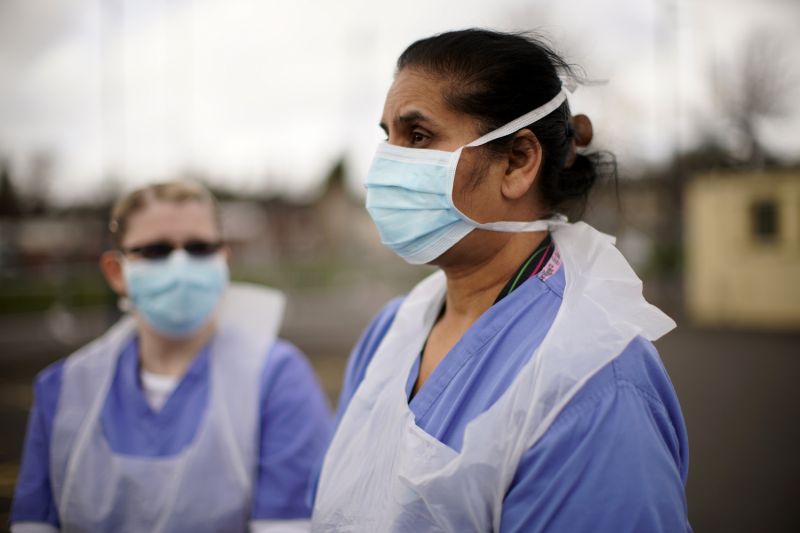The government has recommended that NHS staff in England should receive a 1% pay increase this year. Many other public-sector workers will have their pay frozen, with the government warning that the country's finances are under "huge pressure" because of the pandemic.
Health unions have criticised the 1% pay proposal and one - representing nurses - is calling for a 12.5% increase instead. Around half of all public-sector workers, including NHS staff, police officers and teachers, have their salaries negotiated by independent pay-review bodies. These pay bodies - made up of individuals not directly attached to the relevant department but with experience in economics and employee relations - work with government departments, unions and other groups to come up with a recommendation on how pay should change each year.
This recommendation is non-binding.
In November, the government announced that public-sector workers would have their pay frozen in 2021-22. The exception was for those on salaries under £24,000 and NHS staff.
The Department for Health and Social Care (DHSC) gave its evidence to the NHS pay-review body. This particular body looks at almost 1.5 million people, including nurses, midwives and health assistants, working for the NHS across the UK. They do not include doctors, dentists and some senior staff, who have their own pay bodies or agreements.
Effectively, this evidence - laid out in a 115-page document - outlines what the government thinks would be a suitable pay increase for the coming year. It recommends a 1% pay rise across the board for 2021-22, citing the "uncertain" financial situation and current low inflation.
Inflation is under 1% but the Office for Budget Responsibility forecasts that it will rise to 1.5% this year, which would make the 1% increase a real-terms cut. The pay-review body will now take evidence from other groups, including unions and NHS bodies, and do its own calculations before making its recommendation around May. It could recommend a larger pay increase, but the DHSC has said anything more than 1% would require "reprioritisation" of the NHS budget.
Speaking at Friday's Downing Street briefing, Health Secretary Matt Hancock said the pay award reflected the difficult financial circumstances the country is in.
He said: "One of the challenges we've faced as a country is in terms of the financial consequences of the pandemic. We've proposed what we think is affordable to make sure in the NHS people do get a pay rise."
The Royal College of Nursing (RCN) called the recommended 1% pay rise "pitiful", arguing that its members should get 12.5% instead.
Any increase in salaries is expensive because of the huge number of staff working in the health service. Currently almost half the NHS's budget goes on staffing costs - a total of £56.1bn. So a 1% pay increase across the board would equate to more than £500m a year.
In theory, the pay-review bodies make recommendations for all staff across the UK.
However, it is up to the individual UK nations to decide whether to accept them. In Scotland, health and social care staff have already received a one-off "Covid" payment of up to £500. They also received a 1% "interim" pay increase for this year, a placeholder until a final decision is made. The Welsh government said it has "tried not to set a ceiling" on its recommendation to the pay-review body.
In 2010-11, it was decided that pay would be frozen for all public-sector workers as part of government austerity measures. Strict pay freezes or pay caps were implemented until 2018-19, when the government removed these limits and a three-year pay agreement was implemented for NHS staff in England.
But the impact of inflation means that over the whole period some salaries are worth less than they were a decade ago. For example, a newly qualified nurse starting in 2020-21 would be earning about 3% less than one who started in 2010-11, once we account for inflation and the impact of pay freezes and caps.
Nurses are just one part of the NHS workforce and the pay agreement implemented in 2018-19 affected different staff members in different ways. For example, the agreement meant the wages of those in the very lowest pay band, such as housekeeping or security staff, increased by almost 30% over the past three years.
Staff at the top of their pay bands would have had a smaller pay increase. And it's important to point out that the pay of many NHS staff increases automatically each year anyway, as their experience grows and they move up within pay bands.
As in Scotland, the NHS in Wales and Northern Ireland is run by the devolved administrations.
